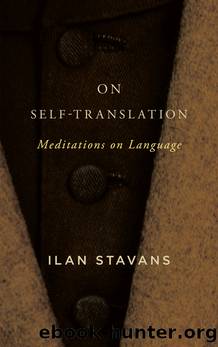On Self-Translation by Ilan Stavans

Author:Ilan Stavans
Language: eng
Format: epub
Publisher: State University of New York Press
Published: 2018-07-14T16:00:00+00:00
First published in The Chronicle of Higher Education, July 10, 2016.
ROLLING ONE’S R’S
Rather than simply delivering the news, Vanessa Ruiz, an anchor for 12 News in Arizona, recently became news herself when her pronunciation of Spanish words drew complaints. The feeling was that, in an English-language TV newscast, she ought to be pronouncing these words the way a majority of English speakers do—not as Spanish speakers would.
Exhibit A in this controversy is that when certain Spanish words crop up in the course of speaking English, she rolls her R’s.
She also pronounces a Spanish name like “Mesa” as “Mess-ah” and not as “May-suh,” as English speakers do. In online comments, some viewers criticized these pronunciations as annoying, stupid, or wrong.
The controversy over Ms. Ruiz’s rolled R’s can easily be framed in the context of a troubling strain of anti-immigrant sentiment, rooted in Arizona in this case, but much in evidence elsewhere. At issue is the contested coexistence not only of two languages, but also of two cultures. In a public statement, Ms. Ruiz politely pointed out that her pronunciation honors Arizona’s original settlers, who were all Iberian.
But there is an even larger picture that deserves our attention: the miraculous malleability of language.
Ms. Ruiz, who was born in Miami and grew up in Colombia, is bilingual, as are about 20 percent of Americans. She started her career at Telemundo, one of the two largest Spanish-language TV networks, then moved to English-language newscasting positions in Florida and California. In other words, she moves between cultures, registering along the way many varieties of speech.
On the air, she speaks English with a standard American accent, in the tradition of Walter Cronkite. And in Spanish, she speaks with a neutral, pan-Latino accent, without any Colombian “localisms.”
It is wrong to think that polyglots inhabit several alternative universes, each defined by a different tongue. In truth, they live only one life, just like everyone else—except that they have the advantage of looking at it through different linguistic lenses.
Languages rarely exist in isolation from one another. English and Spanish, for example, are so intertwined that it sometimes feels as though they’re dancing a tango together. At times, this encounter looks like a fight; at others, a romantic affair.
To me, the most creative manifestation of this phenomenon is code switching: the spontaneous, even joyful, combining of elements of two or more tongues in a single sentence. Hybrid dialects like Yinglish, Spanglish, and Chinglish are examples of this cross-fertilization.
But there are more discreet, less showy ways. One is to sprinkle one’s speech in one language with occasional words from another. This is done with an insider’s knowledge, pronouncing syllables with a natural cadence.
To be sure, there are always those who wish to police language and protect it from such promiscuous mixing. Yet all languages are mutable over time. The original explorers, missionaries and colonists who migrated from Spain to the American Southwest, spoke quite differently than Spanish speakers today. They themselves came from different provinces, with different phonological, grammatical, and lexical variations, so who even knows how any of them would have pronounced “Mesa.
Download
This site does not store any files on its server. We only index and link to content provided by other sites. Please contact the content providers to delete copyright contents if any and email us, we'll remove relevant links or contents immediately.
The Rules Do Not Apply by Ariel Levy(4969)
Bluets by Maggie Nelson(4556)
Too Much and Not the Mood by Durga Chew-Bose(4348)
Pre-Suasion: A Revolutionary Way to Influence and Persuade by Robert Cialdini(4232)
The Motorcycle Diaries by Ernesto Che Guevara(4101)
Walking by Henry David Thoreau(3962)
Schaum's Quick Guide to Writing Great Short Stories by Margaret Lucke(3381)
The Daily Stoic by Holiday Ryan & Hanselman Stephen(3322)
What If This Were Enough? by Heather Havrilesky(3311)
The Day I Stopped Drinking Milk by Sudha Murty(3197)
The Social Psychology of Inequality by Unknown(3031)
Why I Write by George Orwell(2954)
Letters From a Stoic by Seneca(2800)
A Short History of Nearly Everything by Bryson Bill(2698)
A Burst of Light by Audre Lorde(2607)
Insomniac City by Bill Hayes(2558)
Feel Free by Zadie Smith(2481)
Upstream by Mary Oliver(2390)
Miami by Joan Didion(2368)
